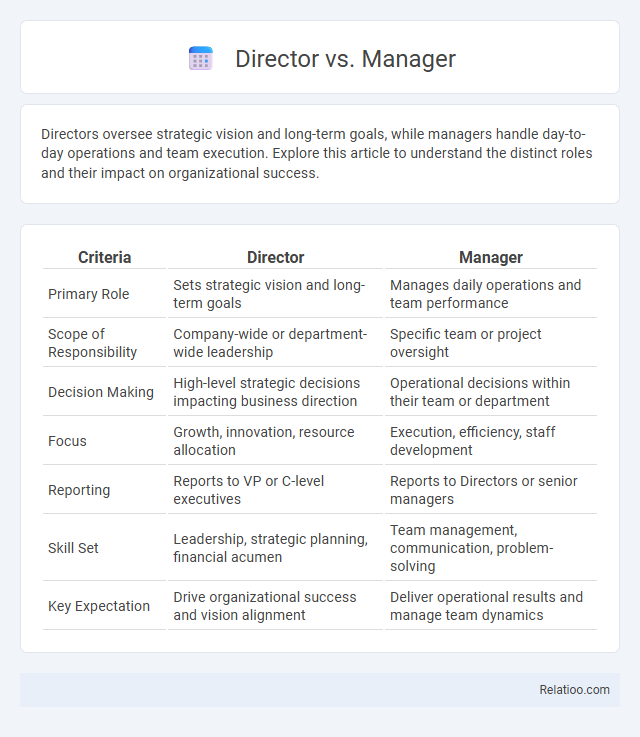Directors oversee strategic vision and long-term goals, while managers handle day-to-day operations and team execution. Explore this article to understand the distinct roles and their impact on organizational success.
Table of Comparison
| Criteria | Director | Manager |
|---|---|---|
| Primary Role | Sets strategic vision and long-term goals | Manages daily operations and team performance |
| Scope of Responsibility | Company-wide or department-wide leadership | Specific team or project oversight |
| Decision Making | High-level strategic decisions impacting business direction | Operational decisions within their team or department |
| Focus | Growth, innovation, resource allocation | Execution, efficiency, staff development |
| Reporting | Reports to VP or C-level executives | Reports to Directors or senior managers |
| Skill Set | Leadership, strategic planning, financial acumen | Team management, communication, problem-solving |
| Key Expectation | Drive organizational success and vision alignment | Deliver operational results and manage team dynamics |
Understanding the Roles: Director vs Manager
Directors oversee strategic vision and organizational goals, guiding multiple teams or departments toward long-term success. Managers handle day-to-day operations, ensuring specific projects and team tasks are executed efficiently within the director's framework. Understanding the distinction clarifies organizational hierarchy, where directors focus on high-level planning and managers concentrate on tactical implementation.
Key Responsibilities of Directors
Directors are responsible for setting strategic goals, overseeing organizational performance, and ensuring alignment with company vision, unlike managers who focus on day-to-day team operations. Key responsibilities of directors include guiding senior leadership, making high-level decisions, and managing resources to drive long-term growth. Your understanding of these roles helps clarify how directors shape corporate policy and lead executive direction.
Core Duties of Managers
Managers primarily oversee daily operations, coordinate team activities, and ensure project goals align with organizational objectives. They handle resource allocation, monitor performance metrics, and facilitate communication between teams and upper management. Directors focus more on strategic planning and long-term vision, while roles vary based on organizational structure and specific job functions.
Decision-Making Power: Who Holds More Authority?
Directors typically hold more decision-making power than managers, overseeing strategic goals and long-term planning for the organization, while managers focus on implementing those strategies and handling day-to-day operations. Your role determines the authority you wield, with directors having the capacity to make high-level choices affecting multiple departments, whereas managers make tactical decisions within their teams. Understanding these distinctions clarifies how decision-making authority is distributed across different leadership roles.
Skills Required: Director vs Manager
Directors require advanced leadership skills, strategic vision, and the ability to influence organizational direction, whereas managers focus more on operational expertise, team coordination, and task execution. Strong communication, decision-making, and project management skills are essential for managers to ensure team productivity, while directors must excel in stakeholder management and long-term planning. Your development in these roles hinges on acquiring skills that match the scope and impact of each position within the company hierarchy.
Reporting Structure and Hierarchies
Directors typically oversee multiple managers and departments, establishing strategic goals and ensuring alignment with corporate objectives. Managers report directly to directors, handling day-to-day operations and supervising individual teams to meet project targets. Your understanding of this hierarchy clarifies responsibilities and optimizes the reporting structure for efficient organizational performance.
Impact on Organizational Strategy
Directors shape organizational strategy by setting long-term goals and aligning resources with the company's vision, influencing high-level decisions that drive growth. Managers translate these strategic objectives into operational plans, coordinating teams and workflows to ensure effective execution and alignment with broader goals. Your understanding of these roles highlights that while directors focus on strategic impact, managers ensure tactical success critical to achieving organizational ambitions.
Career Path: Progression from Manager to Director
Advancing from manager to director requires developing strategic leadership skills, overseeing cross-functional teams, and driving organizational goals at a higher level. Managers focus on executing daily operations and managing team performance, while directors prioritize long-term planning, resource allocation, and influencing company-wide decisions. Career progression hinges on demonstrating impact in managing projects, mentoring managers, and aligning departmental objectives with executive vision.
Salary and Compensation Differences
Director roles typically command higher salaries than managers due to greater strategic responsibilities and oversight of multiple teams or departments. Manager compensation varies widely based on industry, experience, and team size but generally includes bonuses tied to project or operational performance. Understanding these salary and compensation differences helps you better negotiate and align your career goals with market expectations for each role.
Choosing the Right Role: Which is Best for You?
Choosing the right role depends on your career goals, leadership style, and responsibilities you're willing to undertake. Directors typically focus on strategic oversight and long-term vision, Managers handle day-to-day team operations and tactical execution, while roles vary in scope and authority across organizations. Understanding these distinctions helps you decide which position aligns best with your skills and professional aspirations.

Infographic: Director vs Manager
 relatioo.com
relatioo.com